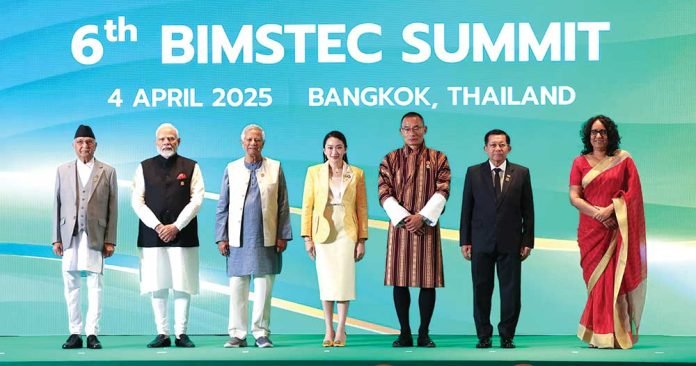Underlining that BIMSTEC is a model for inclusive development and collective security and it is not merely a regional organisation, Prime Minister Narendra Modi Friday announced more than 20 initiatives — from the mechanism of Home Ministers on security to UPI connecting payment mechanisms, an energy centre to a chamber of commerce.
Speaking at the 6th BIMSTEC Summit in Bangkok, Modi said, “BIMSTEC serves as a vital bridge between South and Southeast Asia, and is emerging as a powerful platform for advancing regional connectivity, cooperation and shared prosperity.”
“It is a matter of great satisfaction that the BIMSTEC Charter came into force last year. I am confident that the Bangkok Vision 2030, which we are adopting today, will further our collective commitment to building a prosperous, secure, and inclusive Bay of Bengal region,” he said.
Stating that BIMSTEC embodies the spirit of ‘Sabka Saath, Sabka Vikas, Sabka Prayas’, he said “it stands as a testament to our shared commitments and the strength of our unity… I am confident that together, we will continue to strengthen the spirit of solidarity, cooperation, and mutual trust, and take BIMSTEC to even greater heights.”
Another major step forward was elevation of India’s bilateral ties with Thailand to a strategic level and thereby giving a new impetus to the Bay of Bengal regional forum, namely, BIMSTEC.
With this boost to Indo-Thai relations, Prime Minister Narendra Modi has strengthened India’s Act East policy and deepened India’s initiatives to promote inter-regional cooperation.
Modi’s brief sojourn in Bangkok, the first bilateral visit in more than a decade, has helped consolidate the efforts in the last few years in advancing bilateral ties.
India revived the BIMSTEC grouping in 2016 after the SAARC summit was cancelled. India boycotted the SAARC summit after the Pakistan-sponsored terror attack in Uri. Pakistan is not a member of the BIMSTEC grouping which has Bangladesh, Bhutan, India, Myanmar, Nepal, Sri Lanka, and Thailand — countries dependent on the Bay of Bengal.
What is of significance is India’s strengthening of bilateral ties with Thailand as it is a good sign of revitalising BIMSTEC forum in the wake of the SAARC being almost in limbo since Pakistan decided to stay away from the regional cooperation forum
On security cooperation, Modi said, “To further strengthen BIMSTEC, we must continue to expand its scope and enhance its institutional capacities. It is encouraging to note that the Home Ministers’ mechanism is being institutionalised. This forum can play a major role in the fight against cyber crime, cyber security threats, terrorism, drug trafficking and human trafficking. In this regard, I propose that India host the first meeting of this mechanism later this year.”
Stating that for “regional development, physical connectivity must go hand in hand with digital and energy connectivity”, he said nations should accelerate efforts towards achieving electric grid interconnectivity across the region.
He also proposed establishing connectivity between India’s Unified Payments Interface (UPI) and the payment systems of BIMSTEC member states. “Such integration would bring substantial benefits across trade, industry and tourism, enhancing economic activity at all levels.” he said.
What is of significance is India’s strengthening of bilateral ties with Thailand as it is a good sign of revitalising BIMSTEC forum in the wake of the SAARC being almost in limbo since Pakistan decided to stay away from the regional cooperation forum.
Pakistan’s attitude gave a boost to the Modi government in rebooting BIMSTEC and paving the way towards greater institutionalisation of BIMSTEC in the form of a charter and more specific cooperation in a broad range of areas.
The Bangkok Summit of BIMSTEC saw the conclusion of a maritime transport cooperation agreement and adoption of a vision document at the forum.
On trade and business, Modi proposed the establishment of a BIMSTEC Chamber of Commerce. Additionally, an annual BIMSTEC Business Summit will be organised to foster greater economic engagement.
“I would also suggest conducting a feasibility study to explore the potential for trade in local currencies within the BIMSTEC region.” he said.
Modi proposed the establishment of a BIMSTEC Centre of Excellence for Disaster Management in India. This centre will facilitate cooperation in disaster preparedness, relief, and rehabilitation efforts. Additionally, the fourth joint exercise among the BIMSTEC Disaster Management Authorities will be held in India later this year.”
Modi also extended a warm welcome to Bangladesh as the incoming Chair of BIMSTEC.
The summit adopted the “Declaration of 6th BIMSTEC Summit, Bangkok Vision 2030”, which is the first vision document to provide a comprehensive and practical roadmap for future cooperation amongst the BIMSTEC member states.
It also adopted “Rules of Procedure for the BIMSTEC Mechanisms”, which, together with the Charter, lay the foundation of the institutional framework for regional cooperation under BIMSTEC.
Pakistan’s attitude gave a boost to the Modi government in rebooting BIMSTEC and paving the way towards greater institutiona-lisation of BIMSTEC in the form of a charter and more specific cooperation in a broad range of areas
They also adopted the report of Eminent Persons’ Group on the Future Direction of BIMSTEC. The document contains recommendations for enhancing trade through Free Trade Agreements (FTAs), trade facilitation measures, implementing Single Window systems, and developing multimodal connectivity strategies, all aimed at streamlining regional trade.
“If adopted, this will be very important to advance the cause of regional cooperation,” said Prof Mustafizur Rahman, a distinguished fellow at the Centre for Policy Dialogue.

Bangladesh’s Chief Adviser’s Press Secretary Shafiqul Alam said the BIMSTEC chairmanship will officially be handed over to Bangladesh from Thailand.
“Chief Adviser Prof Muhammad Yunus is a great advocate for regional cooperation, economic development, and people-to-people contact. He will prioritise promoting trade and investment and improving relations with all regional countries,” he told reporters in Bangkok as leaders from Bangladesh, Bhutan, India, Myanmar, Nepal, Sri Lanka, and Thailand arrived in the Thai capital.
However, according to foreign policy analysts and economists, BIMSTEC has not achieved much in its journey of 27 years.
The combined economic size of BIMSTEC members stands at around $4.7 trillion, highlighting the bloc’s vast potential for boosting intra-regional trade, but its intra-regional trade accounts for just 7 percent of its total trade, which is 25 percent for the Association of Southeast Asian Nations (Asean).
Prof Mustafizur Rahman said the framework agreement of BIMSTEC was signed in 2004, but the Free Trade Agreement (FTA) could not be signed yet. The member countries failed to reach consensus on crucial trade issues, specifically regarding rules of origin and trade in goods and services.
Selim Raihan, professor of economics at Dhaka University, said one significant obstacle for BIMSTEC is the lack of political commitment from the leaders of member countries.
“Larger nations have not consistently demonstrated the political will required to push the agenda forward, while smaller nations have not prioritised BIMSTEC sufficiently,” he said.
Prof Mustafizur Rahman, however, said trade and economic cooperation can go on despite the political or bilateral issues among the members.
The 6th BIMSTEC Summit with the theme “Prosperous, Resilient, and Open BIMSTEC,” sought to enhance regional cooperation on trade, security, connectivity, and endorse the Bangkok Vision 2030.
“The regional integration is more important than ever as a trade war is on the rise,” Prof Rahman said in reference to the Trump administration imposing higher tariffs globally.
– The writer is a senior journalist and media consultant. The views expressed are of the writer and do not necessarily reflect the views of Raksha Anirveda.






